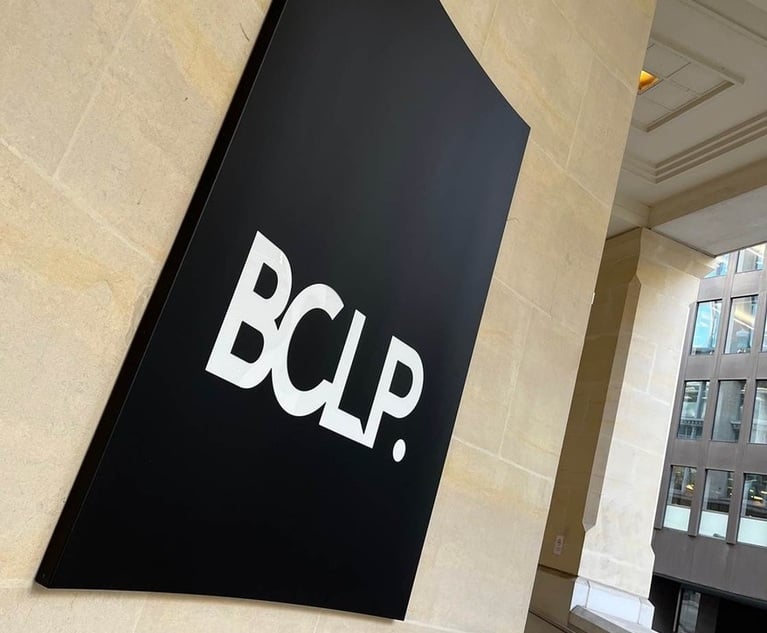SNR Denton takes tough line on exit terms as partners quit and UK PEP falls 36%
SNR Denton has been hit by the resignation of two more key partners as it emerges that the firm may hold senior equity partners to a 12-month notice period. The latest partners to hand in their notice are regulatory head Chris Borg and senior banking partner Michael Black, who are set to join Reed Smith and Norton Rose respectively.
June 29, 2011 at 07:03 PM
3 minute read
SNR Denton has been hit by the resignation of two more key partners as it emerges that the firm may hold senior equity partners to a 12-month notice period.
The latest partners to hand in their notice are regulatory head Chris Borg and senior banking partner Michael Black, who are set to join Reed Smith and Norton Rose respectively.
The departures come after the resignations earlier this year of advocacy chief Rory McAlpine and the firm's sole social housing financing specialist partner Ian Roberts for Skadden Arps Slate Meagher & Flom and Pinsent Masons respectively.
All of the partners and the firms they are joining are currently in negotiations with SNR Denton's management over release dates. None have been put on gardening leave.
The move to hold senior equity partners to 12 months' notice is understood to be unusual for the firm, although a spokesperson said that it did not represent a change in policy.
Commenting on the notice periods, one ex-partner said: "I can only guess that they are doing it to deter others from leaving, but it doesn't seem like a very effective strategy to me and could be counter-productive when SNR Denton itself is trying to hire partners in the future."
The news comes against a background of sharply falling profitability at the newly-merged firm's UK arm. Partners were informed at a meeting on Monday (27 June) that partner profits for 2010-11 fell by 36% to £232,000 from last year's figure of £360,000.
The firm has also seen revenues fall during the year, with unaudited figures showing that turnover dropped by 8% from £167.5m to £154.4m.
After confirming the significant drop in profits to partners, SNR Denton chief executive, Elliott Portnoy (pictured), who is in London this week, is understood to have pledged that the merged firm's EMEA arm will bring average partner profits back to £400,000 during the current financial year.
In a statement, the firm commented: "In a year of transformation for our firm, including the addition of over 50 partners worldwide, the tough climate of 2010-11 did not meet the economic aspirations of our EMEA business. However, based on steps being taken by the new EMEA board and improvements in trading, we are budgeting for a substantial turnaround this year."
For more analysis, see Post-merger turbulence puts pressure on for SNR Denton.
Related:
This content has been archived. It is available through our partners, LexisNexis® and Bloomberg Law.
To view this content, please continue to their sites.
Not a Lexis Subscriber?
Subscribe Now
Not a Bloomberg Law Subscriber?
Subscribe Now
NOT FOR REPRINT
© 2025 ALM Global, LLC, All Rights Reserved. Request academic re-use from www.copyright.com. All other uses, submit a request to [email protected]. For more information visit Asset & Logo Licensing.
You Might Like
View All
BCLP Joins Crowded Saudi Legal Market with Plans to Open Two Offices
3 minute read
'A Breakthrough Year': White & Case Crosses $4M in PEP, $3B in Revenue
6 minute readTrending Stories
- 1Judge Pauses Deadline for Federal Workers to Accept Trump Resignation Offer
- 2DeepSeek Isn’t Yet Impacting Legal Tech Development. But That Could Soon Change.
- 3'Landmark' New York Commission Set to Study Overburdened, Under-Resourced Family Courts
- 4Wave of Commercial Real Estate Refinance Could Drown Property Owners
- 5Redeveloping Real Estate After Natural Disasters: Challenges, Strategies and Opportunities
Who Got The Work
J. Brugh Lower of Gibbons has entered an appearance for industrial equipment supplier Devco Corporation in a pending trademark infringement lawsuit. The suit, accusing the defendant of selling knock-off Graco products, was filed Dec. 18 in New Jersey District Court by Rivkin Radler on behalf of Graco Inc. and Graco Minnesota. The case, assigned to U.S. District Judge Zahid N. Quraishi, is 3:24-cv-11294, Graco Inc. et al v. Devco Corporation.
Who Got The Work
Rebecca Maller-Stein and Kent A. Yalowitz of Arnold & Porter Kaye Scholer have entered their appearances for Hanaco Venture Capital and its executives, Lior Prosor and David Frankel, in a pending securities lawsuit. The action, filed on Dec. 24 in New York Southern District Court by Zell, Aron & Co. on behalf of Goldeneye Advisors, accuses the defendants of negligently and fraudulently managing the plaintiff's $1 million investment. The case, assigned to U.S. District Judge Vernon S. Broderick, is 1:24-cv-09918, Goldeneye Advisors, LLC v. Hanaco Venture Capital, Ltd. et al.
Who Got The Work
Attorneys from A&O Shearman has stepped in as defense counsel for Toronto-Dominion Bank and other defendants in a pending securities class action. The suit, filed Dec. 11 in New York Southern District Court by Bleichmar Fonti & Auld, accuses the defendants of concealing the bank's 'pervasive' deficiencies in regards to its compliance with the Bank Secrecy Act and the quality of its anti-money laundering controls. The case, assigned to U.S. District Judge Arun Subramanian, is 1:24-cv-09445, Gonzalez v. The Toronto-Dominion Bank et al.
Who Got The Work
Crown Castle International, a Pennsylvania company providing shared communications infrastructure, has turned to Luke D. Wolf of Gordon Rees Scully Mansukhani to fend off a pending breach-of-contract lawsuit. The court action, filed Nov. 25 in Michigan Eastern District Court by Hooper Hathaway PC on behalf of The Town Residences LLC, accuses Crown Castle of failing to transfer approximately $30,000 in utility payments from T-Mobile in breach of a roof-top lease and assignment agreement. The case, assigned to U.S. District Judge Susan K. Declercq, is 2:24-cv-13131, The Town Residences LLC v. T-Mobile US, Inc. et al.
Who Got The Work
Wilfred P. Coronato and Daniel M. Schwartz of McCarter & English have stepped in as defense counsel to Electrolux Home Products Inc. in a pending product liability lawsuit. The court action, filed Nov. 26 in New York Eastern District Court by Poulos Lopiccolo PC and Nagel Rice LLP on behalf of David Stern, alleges that the defendant's refrigerators’ drawers and shelving repeatedly break and fall apart within months after purchase. The case, assigned to U.S. District Judge Joan M. Azrack, is 2:24-cv-08204, Stern v. Electrolux Home Products, Inc.
Featured Firms
Law Offices of Gary Martin Hays & Associates, P.C.
(470) 294-1674
Law Offices of Mark E. Salomone
(857) 444-6468
Smith & Hassler
(713) 739-1250










